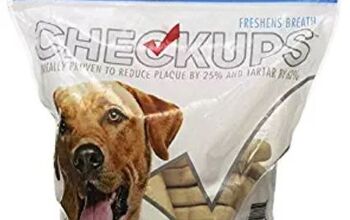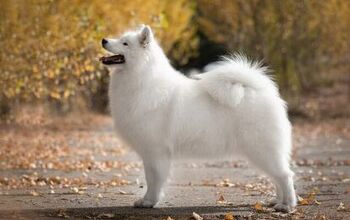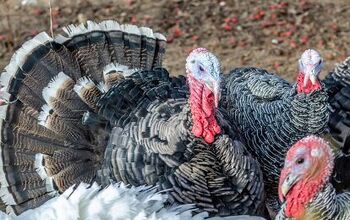Best Dog Treats for Small Dogs

All dogs deserve a special treat on occasion. But with so many different treat options on the market, where do you start with choosing the best option? If you find yourself feeling overwhelmed with buzzwords like “grain-free,” “all-natural,” or “limited ingredient,” you’re not alone! As companies work harder to find ways to make their treats stand out above their competitors, navigating the market becomes increasingly challenging.
To make it even more challenging, small dog owners must ensure that any treats they purchase are small enough for their dog or can be broken into smaller pieces.
The first step to choosing the best dog treats for your small dog is understanding what you should look for. This includes identifying high-quality ingredients, understanding the labels you may see on the packaging, and recognizing the incredible health benefits that some treats offer. Here is our list of the 10 best dog treats for small dogs and tips for translating pet food packaging.
Editors Choice: Bocce’s Bakery Oven Baked Bac’n Nutty Treats for Dogs
If you’re looking for a tasty premium treat option for your dog, the Soft & Chewy line of treats from Bocce’s Bakery is a great choice. Baked in the United States, the company takes pride in including only 100% high-quality, real ingredients. The treats are medium-sized in a B shape, but the soft texture allows them to be broken up for smaller dogs. But be careful not to feed your pup too many as they are 14 calories per treat.
Pros
- Made with just 4 all-natural ingredients
- Soft & chewy texture makes them easy to break up for smaller dogs
- Baked in the United States
Cons
- Treats are higher in calories
- Pet parents warn that the treats often crumble when broken
Runner-Up: Merrick Lil’ Plates Bitty Beef Recipe Grain-Free Small Dog Treats
These adorable little treats are made specifically with smaller dogs in mind. They are also soft enough to be broken further for tiny dogs or training purposes. But be careful not to leave the treats in your treat bag for too long, as some dog parents warn that they harden up quickly. The recipe includes Omega-3 and Omega-6 fatty acids to support skin and coat health and prebiotic fiber for optimal digestion. Merrick Lil’ Plates treats are a healthy and tasty choice for your pup.
Pros
- Treats are sized for smaller dogs
- Contains prebiotic fiber and Omega fatty acids
- Made with real deboned beef for plenty of flavor
Cons
- Higher price point
- Treats harden quickly if the package is not fully sealed or if left in a treat bag
Best Training Treats for Small Dogs: Zuke’s Mini Naturals Training Dog Treats
When searching for training treats, you want something small enough for a quick reward, low-calorie to avoid overfeeding, and pocket-friendly (not crumbly). These training treats from Zuke’s hit all those points. They are made with high-quality ingredients that focus on high nutrient absorption to allow your pup to take full advantage of the nutritional benefits on your next adventure.
Pros
- Small size and soft breakable texture
- Low-calorie to allow for larger quantities during training
- Manufactured in the US
Cons
- Higher fat content may cause digestive issues for some dogs
- Some pet parents find the odor unpleasant
Best Dental Treats for Small Dogs: Yummy Combs Dog Dental Treats
If you plan on treating your dog, why not clean their teeth and improve their oral health simultaneously? The unique honeycomb shape of this treat scrapes away plaque and tartar as your dog chews. While they aren’t a substitute for professional cleanings, they are an excellent option for regular maintenance. The treats themselves are all-natural and veterinarian-approved. Yummy Combs treats contain 44% protein and are formulated to support your dog’s health.
Pros
- Deep pockets clean up to the gum line
- Includes 12 wellness ingredients for a nutritional boost
- Contains patent pending Slick’M to prevent blockages
Cons
- Wider design may be difficult for tiny dogs, even in the smallest available sizes
- Higher price point
Best Low-Calorie Treats for Small Dogs: Charlee Bear Original Crunch Dog Treats
Inspired by a rescue dog named Charlee, these tasty treats have been made for over 25 years in the US. The company continues actively giving back to pet rescues and shelters across the US. The crunchy design of the treat makes it perfect for tossing in your pocket or a treat bag. While the treats are a little larger, the hollow “puff” design makes them relatively easy for your small dog to enjoy. Depending on your choice of flavor, each treat is only 3-6 calories.
Pros
- Low-calorie treat
- Made in the US by a family-owned company
- Available in regular or grain-free varieties
Cons
- Treats may be too large for the tiniest dogs
- Dry texture of the treat crumbles when breaking them up
Best Limited Ingredient Treats for Small Dogs: Natural Balance Limited Ingredient Original Biscuits
A high-quality, limited-ingredient treat is essential if you have a dog that suffers from food allergies. The Natural Balance Limited Ingredient Diets treats are a great choice. Each flavor is formulated with a single protein source to make it easier for pet parents seeking an allergy-friendly option. The small-breed variety offers all the same nutrition in a smaller treat, perfect for your pup.
Pros
- Single protein source in each flavor
- Small dog formula designed for smaller jaw sizes
- Developed by veterinarians and nutrition experts
Cons
- Some dog parents report treats are harder than most biscuit-style treats
- Treats crumble when being broken into smaller pieces
Best Raw Food Dog Treat for Small Dogs: PureBites Freeze Dried RAW Chicken Breast Treats
This single-ingredient dog treat is made from 100% USA-sourced human-grade chicken breast. Not only does this mean that it’s free from unnecessary chemicals and preservatives. As a limited-ingredient treat choice, PureBites are a great choice for dogs with food allergies, gastrointestinal problems, diabetes, and other diet-related struggles. The treats are only 3 calories each, making them a great choice for training.
Pros
- Single-ingredient recipe
- Only 3 calorie average per treat
- Easy-to-digest formula ideal for pets with gastrointestinal problems
Cons
- Treats are crumbly when kept in pockets or treat bags
- Higher price point
Best Budget Treats for Small Dogs: Rachael Ray Nutrish Savory Roasters Real Meat Dog Treats
While the price of these treats may look comparable to all the other treats on the list, the larger bag size makes these treats from Rachael Ray Nutrish a great budget-friendly option. The soft meat treats are too large for many small dogs, but they are easy to break into smaller and more manageable pieces. They are made with US farm-raised chicken and cooked in the US. For those who want to give back, a portion of each purchase is donated to the Rachael Ray Foundation to help animals in need.
Pros
- Budget-friendly pricing
- Soft treat is an excellent choice for older dogs and those with dental problems
- Single protein source in each flavor
Cons
- Higher calorie content per treat
- Treats crumble when broken into smaller pieces or transported
Does My Small Dog Need Small Dog Treats?
The first question you may ask while reading this is: “Does my dog need treats made specifically for small dogs?” Yes! Treats marketed to small dog owners are made to address the unique needs of a smaller dog, including size and nutritional content.
Small dogs have smaller jaws and mouths. This makes it difficult for them to chew and eat many of the larger treats on the market. Some treats for larger dogs are too hard for small dogs and could crack or chip a tooth if your pup tries to eat them. They could pose a choking hazard if they do manage to get a piece off.
Another consideration when picking treats for your small dog is the nutritional content. The smaller the dog, the lower their daily calorie intake should be. Treats are designed to be an occasional reward and only make up a small portion of your dog’s diet. But larger treats can quickly add up for a small dog.
How Do I Choose the Best Small Dog Treats?
When choosing dog treats, you want to consider your dog’s needs. Some dogs are active, hiking and exploring with their people all the time. They may be better suited to a small biscuit-style treat that can safely be tossed in your pocket. On the other hand, a senior dog that may have difficulty chewing these harder treats may be better suited to a soft and chewy treat option.
You may also need to consider health-related needs like low-calorie treats for those trying to lose weight or specific ingredients to prevent triggering allergies. Don’t forget your dog’s personal likes and dislikes. A treat may look fantastic on paper, but your dog turns their nose up at it anytime it’s offered.
How Many Treats Should a Small Dog Have Each Day?
The general rule is that your dog’s treats should only make up 10% of their daily calorie intake, at most. Your dog’s recommended caloric intake will depend on their size, health, lifestyle, and activity level. A healthy diet would be around 150-200 calories for an average adult Yorkshire Terrier. This would mean only 15-20 calories in treats. If you feed a lower-calorie treat that is only 2-3 calories, you can offer more treats than a higher-calorie treat.
Read the calorie content of each treat on the label. If you are breaking up larger treats, you will have to estimate the calorie content based on the number of pieces. Dog parents unsure of their dog’s ideal daily calorie level should contact their veterinarian or a veterinary nutritionist for guidance.
Labels You May See on Dog Treats
Limited Ingredient
Companies that manufacture treats labeled as “limited ingredient” can interpret this term in several different ways. Some take the concept very seriously, creating treats with only 1 or 2 ingredients. An example is the PureBites Freeze Dried RAW Chicken Breast Treats. But the term can apply to any treat with fewer ingredients than traditional pet treats. In many cases, the treat contains only one protein source, but there still could be several other non-protein ingredients in the recipe.
Grain-Free
Treats labelled “grain-free” are made without grains, including corn, wheat, barley, rice, or oats. Instead, they contain other carbohydrates like pea flour or potatoes. There is a lot of controversy right now surrounding grain-free dog foods. Starting in 2020, the FDA began to examine the potential link between grain-free foods and non-hereditary dilated cardiomyopathy (DCM). Research to better understand this connection is still ongoing. However, the FDA has confirmed that they have also received reports of DCM linked to grain-containing diets meaning that simply being “grain-free” doesn’t make a food or treat “bad.”
Natural vs Organic
These two terms are often used interchangeably by dog parents. But they have different definitions in the eyes of The Association of American Feed Control Officials, the association that regulates and oversees these terms. Natural treats are those that are free from artificial flavors and colors. They are also limited to only using natural-source preservatives, nothing artificial. The term organic refers to the plant and animal ingredients they contain. More specifically, it refers to how plants are grown and animals are raised and whether they were exposed to chemical pesticides, fertilizers, or other artificial agents.
What Treats Should Dogs Avoid?
Just as there are guidelines for choosing the best and healthiest dog treats, there are also red flags that you can watch out for. This includes treats with dangerous ingredients that pose a risk for choking or blockage or treats full of inexpensive fillers. Some of the more common synthetic ingredients to avoid include:
· BHA
· BHT
· Propylene glycol
· Ethoxyquin
Avoid purchasing rawhide treats if you have a dog that prefers a harder chew-style treat. While these are commonly found on the shelves of every big box store, they pose a severe risk to your dog’s health. The rawhide does not break down or digest, leading to dangerous or even fatal intestinal blockages.
Finally, steer clear of treats made and shipped from China. These are often purchased as low-cost options, but they keep the costs down by using low-quality ingredients. The FDA has been investigating issues with illnesses and deaths linked to treats from China for years, leading experts to warn pet parents to avoid them when shopping for their pups.

Britt Kascjak is a proud pet mom, sharing her heart (and her home) with her “pack” which includes her husband John, their 2 dogs – Indiana and Lucifer – and their 2 cats – Pippen and Jinx. She has been active in the animal rescue community for over 15 years, volunteering, fostering and advocating for organizations across Canada and the US. In her free time, she enjoys traveling around the country camping, hiking, and canoeing with her pets.
More by Britt































